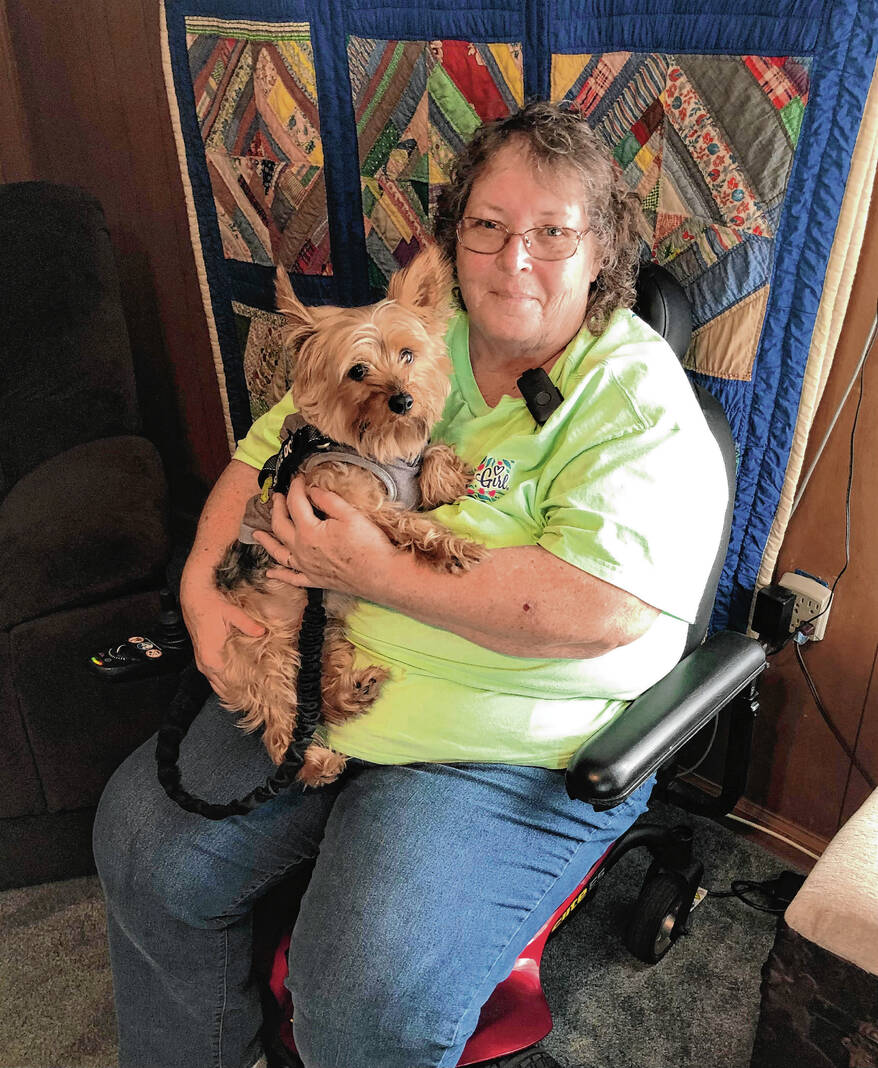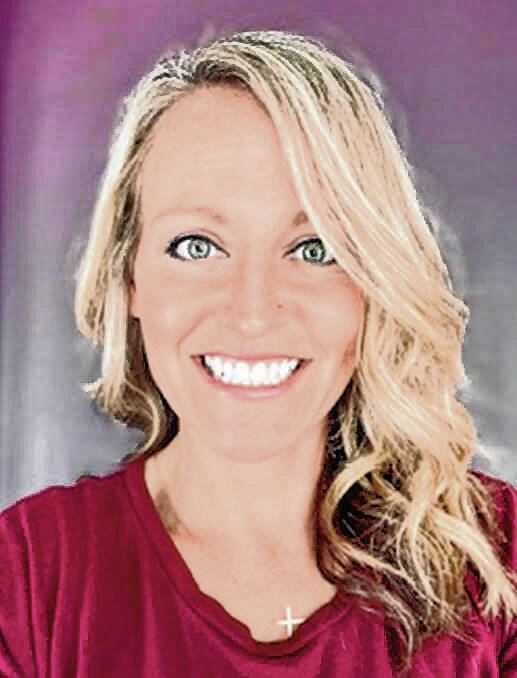
Seymour resident Mary “Deni” Hurt and her therapy dog, Miki Roonie.
Lori McDonald | The Tribune

Royalty

Visiting Angels, 914 E. Tipton St., Suite B, Seymour, provides in-home care to seniors and disabled adults in the community. Tom and Elizabeth Hilbrich are the owners/directors of Visiting Angels locations throughout southern Indiana.
Lori McDonald | The Tribune
As our population shifts and older adults begin to outnumber children for the first time in history, 77% of adults age 50 and over want to remain in their homes for the long term, according to ageplus.org.
Home Care Association of America talks with member agencies every day, and the No. 1 struggle facing most home care agencies right now is being able to hire and retain enough caregivers to meet the demand for services.
Seymour residents Ralph and Mary “Deni” Hurt know the struggle is real to not only find a caregiver but to find the right one.
Mary recently was in need of a caregiver and had been without one for more than five weeks.
“It’s hard because I usually have someone here for 15 hours a week that helps out,” she said. “I had foot surgery this past summer and have several autoimmune diseases, and one is rheumatoid arthritis, which can cause your toes to cross and makes it hard to walk, and this is my second surgery on the same foot, and I was in a boot for six weeks.”
Hurt wants the community to know caregivers are desperately needed, not just in Jackson County but nationwide.
“I’m not 23 anymore or raising kids, but I’m older and I need the help,” she said. “Ralph has his own health issues, and he can’t help me with everything, and we have a lot of appointments we go to in Louisville, Indianapolis and Columbus.”
Hurt said there also are a lot of families with disabled children who need caregivers and some adults that may need more intensive help.
“With COVID, the whole world changed and there are jobs out there, but there might not be people that are wanting a caregiver job or are capable of doing the job,” she said. “Sometimes, when they get into it, they find out it’s not really something they want to do.”
Hurt said she has had three really wonderful caregivers, but for various reasons, they’ve moved on, maybe to other jobs.
“In my case, part of a caregiver’s duty can be grocery shopping, dishes, laundry and to help make sure I’m taking my medications correctly,” she said. “We’re just not able to keep up with all that anymore.”
Hurt said it’s not for a lack of the companies trying because they try hard to get the people.
“They’re having trouble getting people to stay and having them trained properly to do what they need to do, and some of the caregivers don’t understand what’s expected of them,” she said. “For me, part of the problem is when I go to the store, Ralph stays right with me because I get panic attacks, and Miki knows when it’s coming on and stays with me.”
Miki Roonie is Hurt’s 7-year-old therapy dog, which she has had since he was 3 months old.
Hurt currently uses a wheelchair due to her autoimmune diseases and her recent surgery, but she hopes to be up and walking again with the help of a caregiver who can walk along with her when her husband is not physically able to.
“How it works is whatever caregiver company we’re working with, a nurse comes over to talk to me and finds out what is needed,” she said. “Then they set up a meet-and-greet with a potential caregiver to see if the person is a good fit.”
Hurt said some of the job is simply companionship, and one girl, her past caregiver, used to play Skip-Bo or Uno during the last 45 minutes of her shift.
Since her interview for this article, Hurt found a caregiver from Together Homecare of Columbus.
Amberly Royalty, case manager with Options Case Management, is Hurt’s case manager and is the one who helps her find a caregiver or the company with which they’re going to work.
Royalty serves around 65 clients spread throughout 10 counties, but the majority live in Monroe County, specifically the Bloomington area. Options Case Management employs around 30 case managers and serves all 92 counties in Indiana.
She began noticing the staff shortage when the COVID-19 pandemic was declared.
“It especially impacted this field because we primarily serve older individuals and/or those with a weak immune system,” she said. “The fear of contracting COVID-19 discouraged clients from allowing caregivers to come in, and despite employers’ efforts to keep staff, caregivers were forced to find other more reliable work.”
Royalty said from her experience, Monroe County is experiencing the worst staffing shortage, but it is happening all over Indiana.
“My coworkers and I have a group chat, and we are constantly reaching out to one another to inform which providers have staff available,” she said. “At least some point in my day is spent working to ensure all my clients are staffed, and due to the lack of caregivers, there are still a couple without and some that are not able to be fully staffed.”
Royalty said for individuals who are awaiting caregivers, she encourages communication with informal supports, such as family members, friends, neighbors, churches, etc., to assist in any way they can until formal supports are in place.
“There are some who have no source of informal supports, nor do they have the means to private pay for help,” she said. “This is where my being knowledgeable of resources can mean the difference of somebody being able to remain in their home versus seeking nursing facility placement, should that be their goal.”
Three homecare providers are based in Jackson County: Adaptive/Help at Home, Indiana Mentor and Visiting Angels, all of which are located in Seymour, Royalty said.
“I have worked in this field for 18 years, and within this time, I feel individuals who have caregivers are happier, healthier and in general, they have a better quality of life,” she said. “They are an asset in our communities.”
Royalty said thanks to caregivers, family members can continue working instead of quitting their jobs to care for their loved ones, which not only prevents burnout, but it prevents families from having to make the decision to place their loved ones in a nursing facility.
“Caregivers help provide companionship to combat loneliness, especially during the pandemic when their caregiver may be the only face they see, and they help prevent hospitalizations and missed appointments,” she said. “When I ask my clients what their primary goal is, the answer I receive most often is the ability to remain safe in their own home, and caregivers help maintain that goal.”
Tom and Elizabeth Hilbrich are the owners/directors of Visiting Angels in Seymour, providing home care to seniors and disabled adults in the community.
The Hilbrichs also own an office in New Albany and have more than 100 employees serving Clark, Floyd, Harrison, Jackson, Jennings, Lawrence and Scott counties in southern Indiana.
The nationally known but locally owned company provides bathing assistance, dressing assistance, walking assistance, medication reminders, errands and shopping, light housekeeping, meal preparation, friendly companionship, respite care for families and 24-hour care.
The company serves those age 18 and older, including disabled adults, veterans and senior citizens, in the comfort of their own home, no matter where home is.
Tom said coming out from COVID, the demand for caregivers went way up because families were hesitant to put their loved ones is assisted living facilities, so they were keeping them home.
“Many were dual income households where the mom and dad both were working and the loved one was at home, so they looked for a company like ours to fill the gap,” Hilbrich said. “So I wouldn’t call it a shortage but rather an increase in demand, which we are trying to keep up with.”
He said the increase in the senior population has a direct affect on demand of caregivers, as well.
“We have always been of the attitude that we’re not the victim. We go and make our own luck,” he said. “So my managers and I are consistently presenting at high schools as well as community colleges, which have been wonderful hunting ground for us from a labor perspective because it increases our number of applicants, which increases our number of caregivers.”
Anyone interested in becoming a caregiver with Visiting Angels may visit visitingangels.com/employment and fill out an application online.
